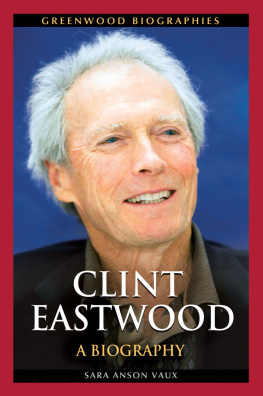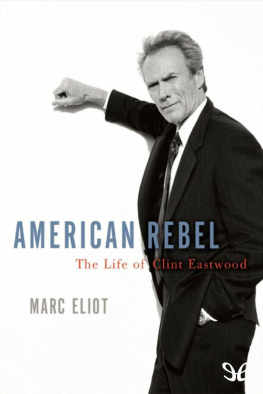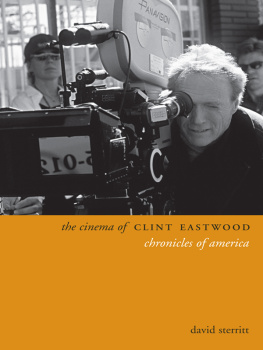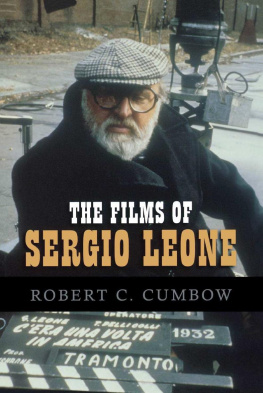THE PHILOSOPHY OF CLINT EASTWOOD
THE PHILOSOPHY OF
CLINT EASTWOOD
Edited by
RICHARD T. MCCLELLAND
AND
BRIAN B. CLAYTON

Copyright 2014 by The University Press of Kentucky
Scholarly publisher for the Commonwealth, serving Bellarmine University, Berea College, Centre College of Kentucky, Eastern Kentucky University, The Filson Historical Society, Georgetown College, Kentucky Historical Society, Kentucky State University, Morehead State University, Murray State University, Northern Kentucky University, Transylvania University, University of Kentucky, University of Louisville, and Western Kentucky University.
All rights reserved.
Editorial and Sales Offices: The University Press of Kentucky
663 South Limestone Street, Lexington, Kentucky 40508-4008
www.kentuckypress.com
18 17 16 15 14 5 4 3 2 1
Library of Congress Cataloging-in-Publication Data
The philosophy of Clint Eastwood / edited by Richard T. McClelland and Brian B. Clayton.
pages cm. (The philosophy of popular culture)
Includes bibliographical references and index.
ISBN 978-0-8131-4263-0 (hardcover : alk paper) ISBN 978-0-8131-4264-7 (pdf) ISBN 978-0-8131-4265-4 (epub)
1. Eastwood, Clint, 1930Criticism and interpretation. I. McClelland, Richard T., 1947- editor of compilation.
PN2287.E37P48 2014
792.028092dc23 2013039727
This book is printed on acid-free paper meeting the requirements of the American National Standard for Permanence in Paper for Printed Library Materials.

Manufactured in the United States of America.

| Member of the Association of
American University Presses |
To Roger Ebert (19422013),
film critic par excellence
CONTENTS
Richard T. McClelland and Brian B. Clayton
David H. Calhoun
Brian B. Clayton
James R. Couch
Erin E. Flynn
Richard Gilmore
Jason Grinnell
Karen D. Hoffman
Deborah Knight and George McKnight
Richard T. McClelland
Richard T. McClelland
Douglas McFarland
Jennifer L. McMahon
INTRODUCTION
Eastwood as Philosopher
Richard T. McClelland and Brian B. Clayton
It is easy to forget that philosophy has not always been practiced as it commonly is today. Most philosophers working today (and over the last couple of centuries) have been academics, usually in universities. There they teach, do research, write for publication, gather to present at professional meetings, and the like. Professional journals and monograph series are often sponsored by university departments, and conferences of all kinds commonly convene on university campuses worldwide. Most philosophers these days possess advanced degrees from universities (though increasingly such degrees do not ensure employment in academic positions). Considered in terms of these traditions of professional formation and deployment, there is ample reason to doubt that Clint Eastwood could plausibly be taken to be a philosopher or to be doing the work of a philosopher in his filmmaking (as actor, director, producer, and/or musician). After all, he does not possess an advanced degree in philosophy (or any closely related discipline), he does not work in an academic institution, he does not present his own creative work in the usual venues that philosophers use. Nevertheless, it is our view that Eastwood is doing substantial philosophical work in and by means of his films. It is the purpose of this introduction to say what we mean by this claim. In doing so we also wish to direct our readers toward the specific essays that make up this volume and some of their distinctive themes. It may be, also, that our notion of practical philosophy (which is what we think Eastwood is doing) will have application elsewhere in the arts and sciences.
One reason for thinking that Eastwood might be philosophizing in his creative work is almost purely negative. Philosophy has not always been practiced as it is today. Indeed, throughout most of its long history it was not. In the ancient world most philosophers (including the few women We have no wish to introduce a spurious demarcation problem for philosophy. But we point out that our present institutional dispositions are entirely contingent and leave room for other approaches. Our view is that Clint Eastwood, notably as a director but also as an actor and a musician, carries out in his creative work substantive philosophical inquiry. Indeed, it has been the work done on this volume which has primarily persuaded its editors of this view. However, his philosophical work has a distinctive character, one that is often in sharp contrast with what ordinarily passes for philosophy.
Philosophy as Craftsmanship
Eastwood is above all else a craftsman, an artisan, a maker of cultural artifacts.Eastwood has undergone a development that constitutes a vital critique of both gun violence (especially in terms of its social and psychological consequences to the gunman) and of the associated conception of masculinity, a development that stretches from the Dirty Harry movies (starting in 1971) to Gran Torino (2008), with Unforgiven as a pivotal moment in that development. David Calhoun also casts his revisionist net very widely, finding evidence for a shift in Eastwoods thinking about the value of so-called rugged individualism, an element of many of Eastwoods early films, already put to the question in Play Misty for Me (1971) and decisively rejected in Million Dollar Baby (2004) and Gran Torino.
These essays show Eastwood to be deeply embedded in his artistic consciousness and in the traditions of his craft, and possessed of a deep understanding of those traditions. But he is also a revisionist, someone who calls these traditions into question and offers alternatives to them. But we may go further, for Eastwood himself insists that a primary purpose of his filmmaking is to tell stories. And these stories engage characters in moments of decision that affect the overall shape of their narrative contexts. And this adds further dimensions to the notion of practical philosophizing.
Characters, Decisions, and Narratives
Eastwood has said almost innumerable times that the story is king. Moreover, he understands stories in a very traditional kind of way: as having beginnings, middles, and ends, all of which need to be presented if the story is to be told. This very traditional kind of narrative structure thus has an intelligible unity to it, the unity of structure both partially constituting the intelligibility of the story and determining how the story will unfold in the course of the film. The characters that he portrays, as an actor, and those whose actions he orders as director, only make sense in the context of the stories they inhabit and contribute to. Something Eastwood does very skillfully in his capacity as director is to show (not just tell) how multiple lives might come to intersect in this way. As such, his style of direction (aided powerfully, of course, by the writing) constitutes not only an aesthetic but also a meta-story. If we are right to argue that Eastwoods oeuvre shows marked signs of coherent development across decades, then that body of work also constitutes a kind of meta-narrative on many of the major themes that preoccupy him.
Next page


![Captain Chesley B. Sullenberger III - Sully [Movie Tie-In] UK: My Search for What Really Matters](/uploads/posts/book/404353/thumbs/captain-chesley-b-sullenberger-iii-sully-movie.jpg)









